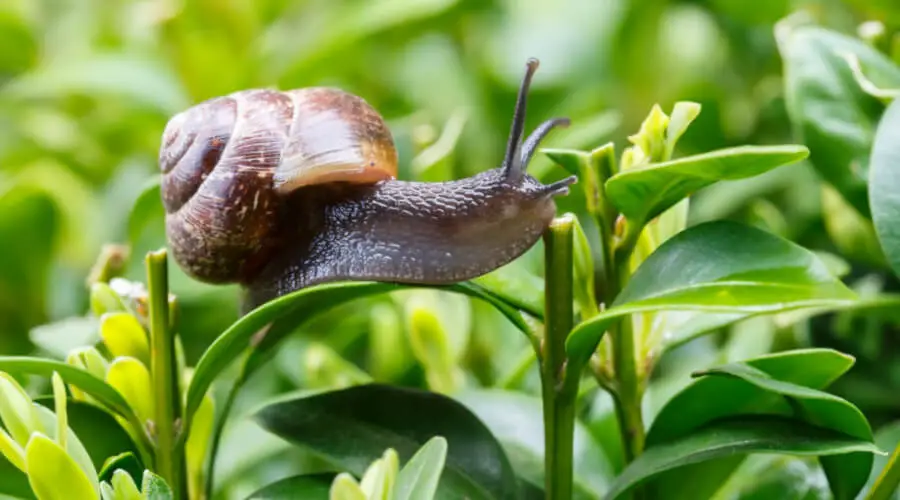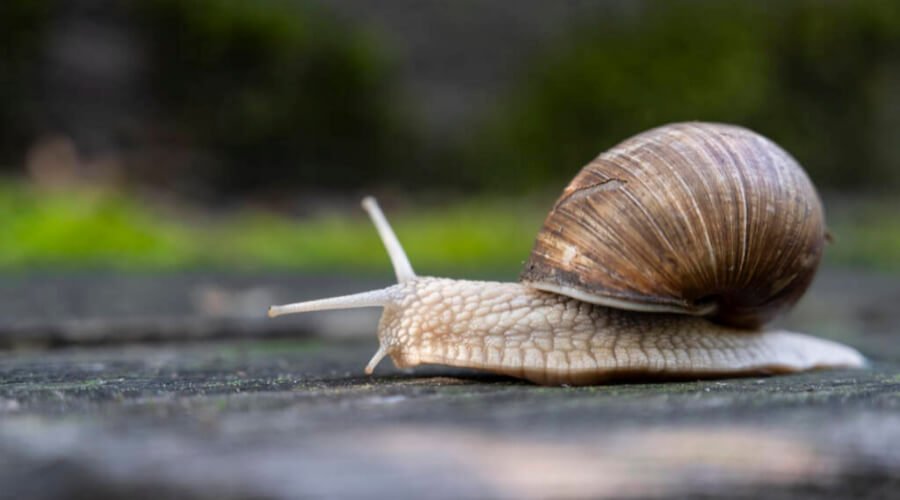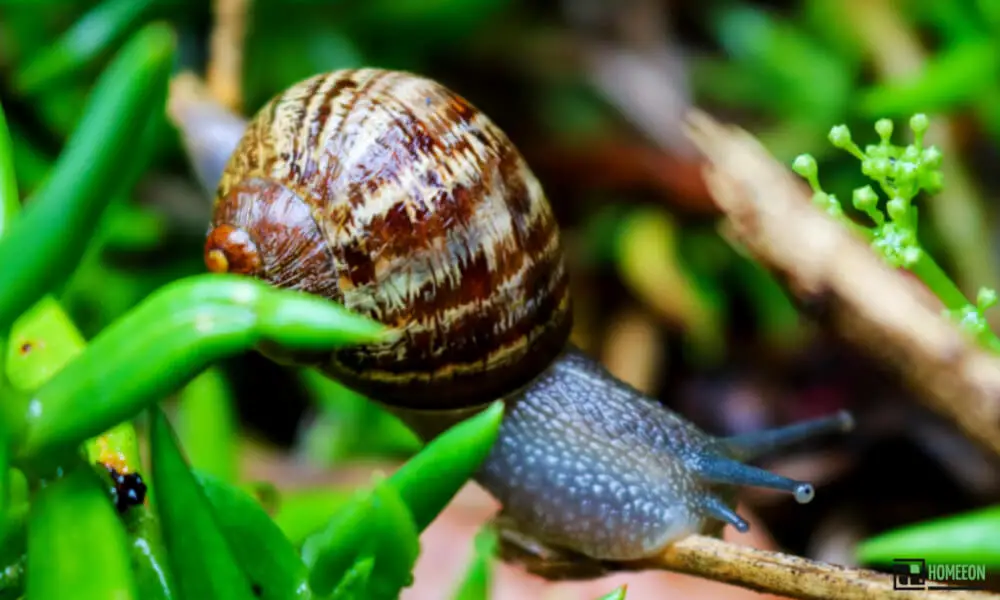Last Updated on July 22, 2023 By Emma W. Thomas
Keeping garden snails as pets can be okay, but it requires proper care. Ensure a suitable enclosure with moisture, fresh food, and calcium supplements. Avoid wild-caught snails due to potential pesticide exposure. Research their specific needs and ensure a safe environment for a fulfilling experience as a pet owner.
Why Would You Want To Keep Garden Snails As Pets?

There are several reasons why you would prefer snails to other creatures as pets, including;
Ease Of Keeping
Snails are among the most accessible pets to keep since they adapt quickly to different conditions. These creatures can comfortably live in a plastic container or a glass terrarium, or you can make them a simple habitat.
Low Maintenance
Pet snails are low-maintenance creatures since their feeding is quite simple. You don’t have to feed them daily and so no need to worry that they will over-eat. These pets stop eating when they have had enough, and you won’t have to give them fresh water. Snails can get water from the humidity in the air or their food. You can also clean their habitat once in a couple of weeks, making it easier to care for the pets while going on with your other day-to-day tasks.
Pleasing To The Eye
Pet snails are stylish creatures that are interesting and relaxing to watch. The animals glide slowly from one point to another and often disobey gravity by sticking upside down or on a vertical wall. It is also relaxing to look at the pets coming in and out of their shells. You will also enjoy seeing the pets use their pairs of tentacles, lay eggs, mate, and eat.
Watching snails do their everyday thing is a spectacular way to cool off the pressure after a hard day’s work.
Little Or No Cost Involved
It is easy to start keeping pet snails without incurring any cost at all by picking garden snails. You may also go for exotic breeds from a pet dealer’s store at a reasonable price. You will also not need to spend money on their food since they will feed on the leftover vegetables from your refrigerator. Snails don’t need regular vet checking, which is an added advantage to the owner.
They Are Noiseless
Keeping pet snails is hustle-free since they are reticent. Unlike other pets like dogs, these creatures produce no noise, which means they won’t bother your neighbors and family. You will not have to wake up very early in the morning or late at night due to unnecessary sounds.
Snails Are Excellent For Children.
Unlike other pets like cats that can scratch, kids can easily care for the snails with little or no supervision. Children only need to be taught the importance of washing their hands before and after handling the snails, and they are good to go. All you need to do is teach your kids how to pick these pets, and you won’t have to worry about them anymore.
You Can Care For Them Even With A Busy Schedule.
Most traditional pets such as birds, fish, dogs, and cats call for a lot of attention which may sometimes not be easy with a busy schedule. You will need to feed them, provide water, clean their habitat, and check their living conditions. But, for snails, you only require a proper setup, then you can leave them unattended for up to one month.
Ensure that your pets have adequate fresh air, enough food that won’t rot, and a high humidity level. While it may not be an excellent idea to leave them for so long without checking, it can still work well if you have an involving schedule.
What to Consider Before Keeping a Pet Snail
Keeping a pet snail may not be as common as owning a dog or a cat, but it can be an intriguing and low-maintenance pet option. However, before deciding to bring a snail into your home, there are a few important factors to consider. Here’s a list of things to think about before adopting a pet snail:
- Local regulations and permits: Some areas have restrictions or regulations regarding the ownership of certain types of snails. Make sure to check your local laws and regulations to ensure you can legally keep a pet snail without any issues.
- Housing requirements: Snails are often kept in terrariums or aquarium tanks. It’s crucial to provide them with an appropriate enclosure that offers enough space, ventilation, and humidity levels suitable for the particular species of snail you wish to keep.
- Snail species selection: There are various species of snails available as pets, each with unique characteristics and care requirements. Do thorough research to choose a species that matches your preferences, available resources, and commitment level. Popular pet snail species include the African Giant Land Snail, Mystery Snail, and Ramshorn Snail.
- Environmental needs: Snails are sensitive to changes in temperature, humidity, and lighting. Ensure that their enclosure maintains a consistent temperature and humidity level within the appropriate range for their species. Moreover, snails prefer dimly lit environments, so it’s essential to avoid excessive lighting.
- Diet and nutrition: Snails are herbivorous creatures, and their diet primarily consists of plants, vegetables, and fruits. Research the specific dietary requirements of the snail species you plan to keep and ensure you can provide a nutritious and well-balanced diet.
- Substrate and habitat enrichment: Snails require a suitable substrate in their enclosure to burrow, hide, and lay eggs. Opt for a substrate that retains moisture and mimics their natural habitat. Additionally, provide various hiding spots, rocks, and other elements to enrich their environment and encourage natural behaviors.
- Maintenance and cleanliness: Snails produce waste, and their enclosures need regular cleaning to maintain hygiene and prevent the buildup of harmful bacteria. Consider the time and effort required for cleaning and maintaining their environment before committing to owning a pet snail.
- Lifespan and commitment: Snails have varying lifespans, depending on the species. Some live for a few years, while others can live for decades. Consider the long-term commitment involved in keeping a pet snail and ensure you are willing to provide care and attention for the duration of its life.
- Potential allergies: Some individuals may have allergies or sensitivities to snails, their secretion, or their enclosures. If you or a family member have a history of allergies, it’s crucial to be cautious and consult a healthcare professional before bringing a snail into your home.
- Ethical considerations: Before acquiring any pet, it’s important to consider the ethical aspects of keeping them in captivity. Ensure that the snails you acquire are from reputable breeders or suppliers who practice responsible and sustainable methods.
Which Snail Species Can You Keep For Pet Keeping?
When choosing the right type of snail for a pet, it is crucial to check the appearance and safety of your family and yourself. Since some of them can transmit diseases to you and your surrounding you need to pick wisely. The following table shows some of the common kinds of snails and their characteristics.
Snail species | Attributes |
Garden snail | Dark-brown and readily available. It is about 4cm long (1.5-inches) |
Giant African land snail | Massive size with a great sense of smell |
Roman snail | Excellent for use in biology classes |
Apple snail | Freshwater snails with a beautiful appearance |
Garden Snail
This type of snail is the most popular and easiest to find. It is dark brown, and one can pick it from the garden at no cost. It is easy to care for this type and take it back to nature when you no longer want to keep it.
Giant African Land Snail
These kinds of snails are enormous and easy to care for. They are also interesting to have around due to their excellent sense of smell to recognize their owner. However, these snails are destructive to crops and thus are illegal to keep as pets in the US and some other countries.
Roman Snails
Besides being excellent pets, Roman snails are suitable for biology classes to equip learners with knowledge. They can have a lifespan of up to 20 years with proper care. While these pets are legal to keep in the US, they are protected by the International Union for Conservation of Nature (IUCN) Red List. One cannot also commercialize or kill the species in the United Kingdom.
Apple Snail
This type of snail is a famous freshwater creature that is quite attractive both in size and color. One of the most common kinds of apple snails is the spike-topped snail. This apple snail has varying colors, such as brown, blue, pink, and yellow. You can purchase this pet snail at reasonable prices from any aquarium shop.
What Are The Main Requirements For Keeping Pet Snails?

While snails are low-maintenance creatures, there are some basic requirements that one needs to consider for the safety of these pets and their owner. Some of the things to pay attention to include;
Terrarium
You can choose where to house your pet snails depending on the length of time you intend to have them around. For example, if you want to observe them for a few days or weeks, you can pick a plastic container. Conversely, if you wish to have your pets for an extended period, then a glass terrarium would be the best bet. You can either purchase the glass terrarium or DIY it and makes sure that it has a fitting lid.
Choose the size of the terrarium depending on how many pets you want to have and their sizes. But, as a rule of thumb, you can pick one gallon per snail. Make sure that the space you choose for your animals is clean before you can bring them in. Be sure to remove any leftover food from the container before it goes bad after keeping the pets here and wipe it with a paper towel or wet piece of cloth.
Proper Ventilation
Snails need proper ventilation like other living organisms since they also take in oxygen and release carbon(IV)Oxide. Make sure that the terrarium you buy or make has tiny holes (smaller than the snails) in the lead to help in air circulation.
Substrate
Ensure that the substrate you use at the bottom of your snail’s terrarium is suitable and gentle enough for your pets. You can use things like hummus, soil, coir, or turf. This material should have a thickness of 3-6 cm (1-2 inches). Since the snails are likely to dig into the substrate, avoid what will make it difficult for them, such as sand, pebbles, or stones.
When choosing the substrate material, ensure that it is free of pests as chemicals that may harm the snails. Ensure that the soil pH is above 6 to prevent it from being too acidic for the creatures. You can purchase a soil tester from your local stores or online.
The Correct Humidity Level And Temperature
Snails adapt to different temperatures depending on the species. For example, some live in the snow, and others in the desert. But, if you are dealing with garden snail pets, make sure that their home has the ideal temperature of between 18 – 300C (65 – 850F). Avoid placing the terrarium under direct sunlight as this can make it too hot for the organism to the point of their death. If your home’s temperature is below 650F, you can equip the terrarium with a heating pad.
Humidity is also very crucial for pet snails, and you should maintain it at 75-90 percent. You can achieve this level by spraying the pet’s shelter once a day or after a few weeks using a small spray bottle. To keep the humidity and temperature under check, you can buy a meter online or from your local stores.
Are Snails Hard to Take Care Of?
Snails can be relatively easy to take care of, but they do have specific care requirements that need to be met. Providing a suitable environment with proper temperature, humidity, substrate, and diet is essential. Regular monitoring of their health and well-being is also necessary for responsible pet ownership. While they may not be as demanding as some other pets, providing the best care for snails does require attention and commitment.
Wrapping It Up
Garden snails can be stylish pets, especially for those people that love the creatures. They are easy to maintain and care for with minimal requirements. If you love these beautiful pets, follow the simple guideline above and be sure to enjoy observing them.
References:
https://www.thesprucepets.com/pet-snail-considerations-5114912
https://www.allfreecrafts.com/nature/insects/pet-garden-snails/
Emma is a graduate of Domestic Science or Family and Consumer Sciences (Home Economics) from the University of Wisconsin. She has 7 years of experience Working with the strategic section of BestBuy and now writing full-time for Homeeon.
From Managing the Home, Interiors, Cleaning, and Exteriors to Gardening and everything about Making A Home Liveable – is her passion and this Homeeon is the result of this.
Emma loves decorating her home with the best stuff found online. She cares about quality over anything and writes reviews about them here in Homeeon. Get in touch with her over Pinterest.
Keep reading her blogs.
